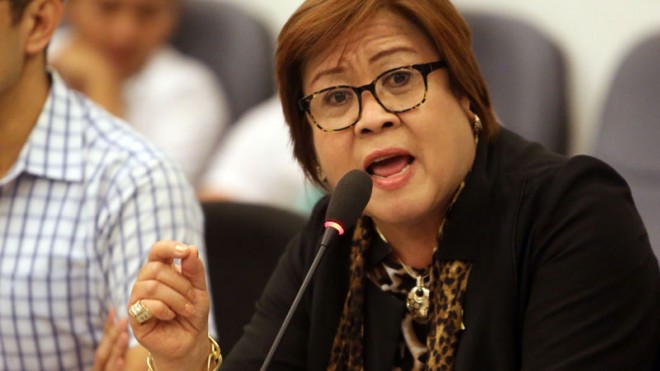MANILA, Philippines–Justice Secretary Leila de Lima did not clear President Aquino of liability in the Mamasapano debacle when she issued an opinion that he may not be faulted for bypassing the Philippine National Police’s chain of command because unlike in the military, this concept did not exist in the PNP.
“That does not mean that the President is not accountable,” De Lima said in a speech to a conference of Rotary International District 3800 in Manila on Friday.
“In fact, he (Aquino) has, time and again, admitted that his mistake may have been to trust the wrong people, who ended up giving him inaccurate, if not outright false, information,” she added.
De Lima earlier said Aquino was exercising his powers as Chief Executive when he approved the Mamasapano operation after discussing the plans with the suspended PNP chief, Director General Alan Purisima, and then Special Action Force (SAF) head, Director Getulio Napeñas.
The justice secretary said this did not violate the PNP chain of command because in the first place, there was no such principle in the police agency.
“I mention this distinction, not to minimize or lessen the President’s command responsibility. When we speak of ‘command responsibility,’ we speak of accountability. The President is, of course, accountable. No question about it,” she explained.
De Lima, however, repeated the contention of some administration officials and supporters that the President should not be blamed because he only relied on other government officials to execute “Oplan Exodus,” the counterterrorism operation in Mamasapano.
“That is an error in judgment that one can only know from hindsight. As we all know, hindsight is 50/50, and it is so easy to play armchair presidents these days,” she said.
Forty-four SAF commandos died in Mamasapano, Maguindanao province, after being attacked by fighters belonging to the Moro Islamic Liberation Front and the Bangsamoro Islamic Freedom Fighters. One of the targets of the operation, suspected bomb maker Zulkifli bin Hir, alias “Marwan,” was reportedly killed in the raid.
Apology not guilt
The PNP board of inquiry (BOI) and the Senate have already made public their reports on the incident. The BOI said the President bypassed the PNP chain of command while the Senate pointed out that Aquino was ultimately responsible for what happened.
The Department of Justice and the Commission on Human Rights are also conducting their own investigations of the encounter.
In Cebu City, Vicente Joyas, president of the Integrated Bar of the Philippines (IBP), said Aquino could still bounce back from the slump of his popularity rating if he apologized for the Mamasapano carnage.
“That is what the entire nation has been waiting for,” Joyas told the Inquirer during the 15th National Lawyers’ Convention. “An apology does not necessarily mean an admission of guilt.”
The IBP will not also support calls for Aquino to step down, Joyas said.
“We want him to finish his term because the moment the President resigns, there will be so many problems that will crop up,” he said. “Let him finish his term. Anyway, his accountability and liability will be raised after his term expires next year.”
Great leaders apologized
Former Sen. Panfilo Lacson, in a speech to the convention, called on the President to apologize and take responsibility for the Mamasapano fiasco, saying Aquino was not only the Commander in Chief of the Armed Forces of the Philippines but of the PNP as well.
“A commander is responsible for everything that his unit does or fails to do. Unlike authority, which may be delegated, responsibility is something that a leader cannot pass on to others. Command responsibility is a time-tested leadership principle practiced and observed by great leaders all over the world,” Lacson said in his speech.
He said US President John F. Kennedy took responsibility for the botched invasion at the Bay of Pigs on the south coast of Cuba. He said US Secretary of State Hillary Clinton also took responsibility for the brutal armed attack on the US diplomatic mission in Benghazi in Libya in September 2012. He said Winston Churchill likewise owned up to responsibility for the failed Galipoli campaign in 1915 that cost the lives of 119,000 allied troops.
“A leader assumes responsibility, not for any reason, except it is the right thing to do. Assuming responsibility does not automatically mean admitting criminal liability,” Lacson said.
Line of authority
Lacson disputed De Lima’s contention that Mr. Aquino was not covered by the principle of chain of command in the PNP. He stressed that the chain of command existed not only in the military but even in a civilian business organization.
“The chain of command is simply the line of authority, responsibility and communication in any organization. It defines and establishes the superior-subordinate relationship and is always depicted graphically in an organizational chart. Take out the chain of command and we lose the unity of command,” Lacson said.
He also cited Article VII, Section 18 of the 1987 Constitution, which stated that “The President shall be the Commander in Chief of all armed forces of the Philippines and whenever it becomes necessary, he may call out such armed forces to prevent violence, invasion or rebellion.”
The former PNP chief said that the term “armed forces” in Section 18 was in small letters and did not only refer to the AFP as an institution.
Lacson told lawyers and judges to pray for Aquino that he may overcome the situation that the country was facing now.
Originally posted: 8:47 PM | Sunday, March 22nd, 2015
RELATED STORIES
De Lima: Aquino cannot be held accountable for Mamasapano clash
De Lima: Ramos gave ‘confused’ view on chain of command
